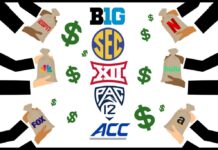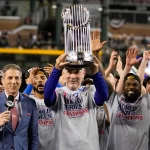It was inevitable. An NBA player gets injured playing for USA Basketball in preparation for an off-season international tournament, and the calls for the end of such participation quickly follow. The injury to Pacers forward Paul George was horrific, indeed, Theismann-esque, but to say it’s the reason players shouldn’t play international ball is simply preposterous.

First thing first – hoopers hoop. It’s what they do. It’s how they stay in shape. If there was a way for football or baseball players to play their games without coaches around, they would too. The fact that USA Basketball provides the best environment for them through working conditions, coaching and training, and not to mention, ultimately, the best competition possible, makes it an ideal way to spend summers. Think back to the last World Championship in 2010 in Turkey. Those were the true breakouts for the likes of Kevin Durant and Russell Westbrook. Lamar Odom followed the trip to Turkey with his best ever season and became NBA Sixth Man of the Year, and the Mavericks learned that Tyson Chandler was healthy enough that he was worth acquiring from Charlotte. We all know how that turned out. As for injury, the George injury is the first serious injury since NBA players began playing internationally in 1992.
And while some may scoff, players love to play with the letters U-S-A across their chest. Say what you will about building brands (which playing for USA Basketball undoubtedly fosters), but since Jerry Colangelo and Mike Krzyzewski took over the program after the debacle of the 2004 Olympics in Athens, there hasn’t been a single player who hasn’t truly loved the experience, and who hasn’t gained from it from a basketball perspective. Of course, going 62-1 in that time with two Olympic Gold Medals and a FIBA World Championship probably made it easy to love.
The naysayers, led by Mavericks owner Mark Cuban, are upset in large part because they believe that the NBA, in its desire to expand its influence globally, has allowed both the International Olympic Committee and FIBA, the world’s governing body for basketball, to financially benefit with no inherent risk. Cuban would prefer that the NBA stage its own event and reap the benefits. While there is merit to the argument, there are also other solutions.

Like FIFA in soccer, The IOC/FIBA could pay club teams and federations a fee for the use of their players in international competitions. I’m sure FC Barcelona would like to have Neymar for the start of their season after paying a king’s ransom for him, but you don’t hear them complaining because Neymar broke a vertebrae playing for Brazil vs Colombia at the World Cup. And to be fair, the Pacers themselves haven’t complained publicly at all since George’s injury.
The NBA owners could also make an addendum to the salary cap that anyone sustaining a catastrophic injury playing internationally (catastrophic defined as missing at least 90 percent of the following season) does not have his salary count against the cap and any potential tax that goes with it be waived as well. The player can be replaced but at only a small fraction of the injured player’s contract. And remember, insurance is paying the majority of the injured player’s salary for the year so there’s little financial loss to the owner.
The biggest issue seems to be one of exposure. In the US, the Olympics matter most. For the rest of the world it’s the FIBA Championship. The best solution is to have one large event every four years. NBA executives would no longer have the “summer grind” as an excuse for not wanting players to participate. Then again, the grind argument actually falls really flat when you compare it to soccer (the only sport basketball trails in international interest and participation), which has a league season and lower level Cup season running simultaneously. The bigger clubs in Europe also have Champions League games running concurrently, and that’s in addition to its most notable players playing with their national teams in international “friendlies” every so often. The NBA has the NBA season. That’s it. No more.
Some have suggested limiting international events to players under 23 years of age, but let’s make no mistake here. There is no value, either to the organizers or fans, in seeing such an event. Once NBA players were allowed into international competition the horse was out of the barn. Once we were exposed to the best competing against the best there was no going back. Indeed FIBA holds U-18 through U-20 events every year. Did you know they existed? Didn’t think so.
There’s no reason for the NBA, the IOC and FIBA to discuss everything in the aftermath of the George injury. But in the end, Paul George’s injury will change nothing. NBA participation in USA Basketball isn’t going away, because beyond some owners’ and executives’ fears, it’s good for the players, and good for the NBA as a whole. And that, by extension, means it’s also good for the owners.









